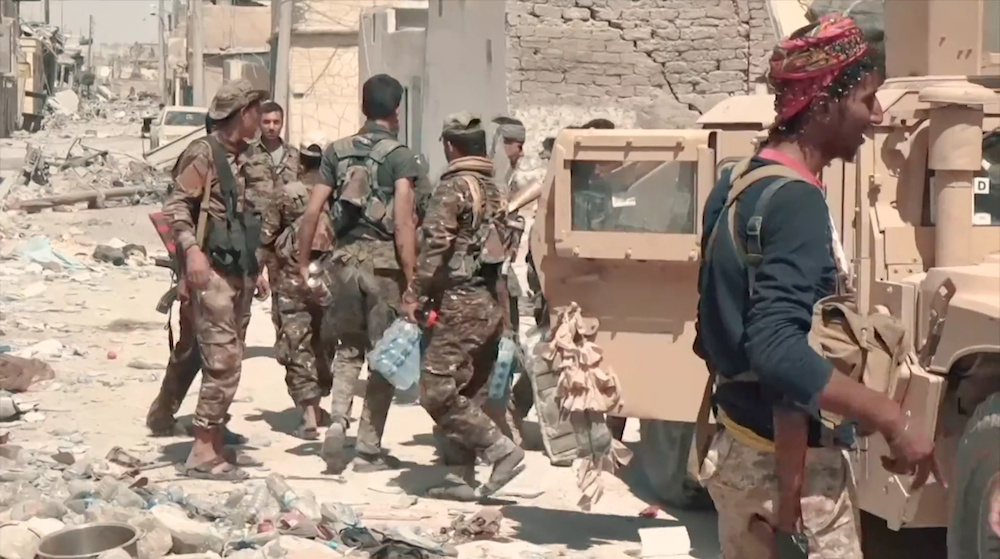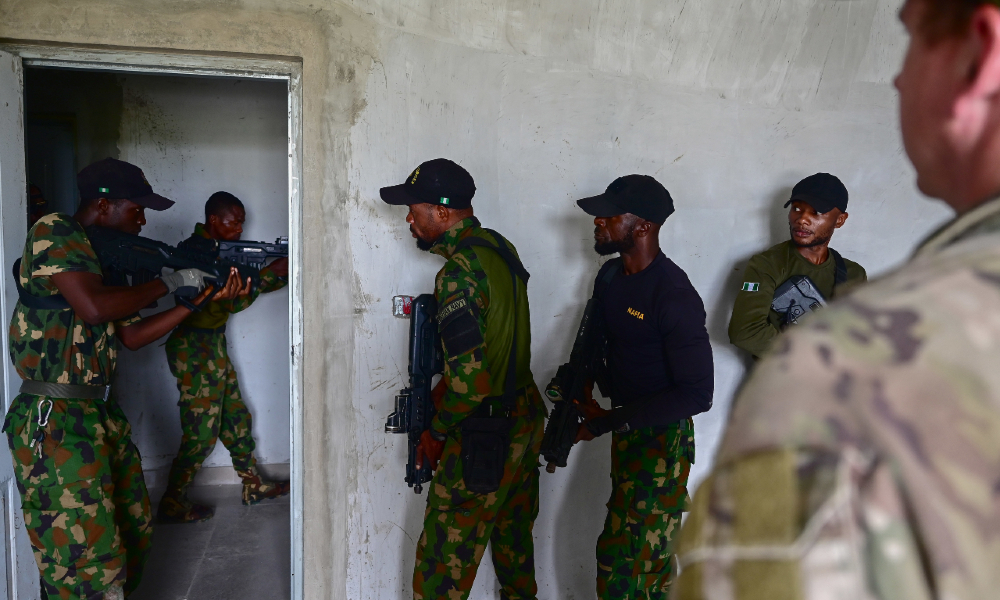Prosecuting the Islamic State Fighters Left Behind
The Kurdish-led Syrian Democratic Forces captured an American-Saudi dual citizen last September suspected to be a member of the Islamic State. Because of his citizenship, he was quickly transferred to Defense Department custody and is being held in Iraq. After nine months of detention and litigation over this U.S.

Published by The Lawfare Institute
in Cooperation With

The Kurdish-led Syrian Democratic Forces captured an American-Saudi dual citizen last September suspected to be a member of the Islamic State. Because of his citizenship, he was quickly transferred to Defense Department custody and is being held in Iraq. After nine months of detention and litigation over this U.S. citizen (whose name has not been made public), the government filed a motion June 6 to release “John Doe” back into Syria. The legal battle continues, however, with the ACLU, which has filed motions on his behalf since last October, now seeking to prevent his release for safety reasons.
Doe’s case may pose the biggest current legal headache for the government, but his is not the only one. The New York Times reported last week that coalition-backed forces in Syria had captured another American fighter fleeing Islamic State territory and that the U.S. government intends to bring the citizen, Ibraheem Musaibli, back to the United States for prosecution on charges of providing material support to a terrorist organization. Unlike with Doe, U.S. officials had built an indictment against Musaibli before he was captured. In addition to Musaibli, the U.S. also returned Samantha El Hassani and her two children. El Hassani, who is charged with making false statements to the FBI, traveled to Syria in 2015 to join ISIS with her husband.
These cases highlight the lack of a coherent U.S. strategy to bring to justice American citizens who fought on behalf of the Islamic State. But the problem is larger than the absence of a U.S. strategy—the international community as a whole is in the same position. After partnering with the Syrian Democratic Forces (SDF) in that country and the government in Iraq to root out the Islamic State, international powers and local forces must decide what to do with former ISIS fighters, both foreigners and locals.
Western countries have been reluctant to bring citizens home. Instead, some states have turned to revoking citizenship, while others have suggested that the death of their citizens on the battlefield may be the best option. In the United States, officials have considered sending foreign fighters to Guantanamo Bay and bringing foreign and American fighters to trial before Article III courts; as in Doe’s case, they appear to be attempting to capture and release fighters.
President Donald Trump signed an executive order in January that revoked President Barack Obama’s directive to close Guantanamo Bay and required Defense Secretary James Mattis to develop criteria for transferring captured suspects there. While some in the administration, such as Attorney General Jeff Sessions, support sending detainees to Guantanamo, others have argued in favor of criminal trials for captured non-American ISIS fighters.
Nathan Sales, the State Department’s coordinator for counterterrorism, said in a press briefing in February that “if a country sees its citizens traveling to Syria and Iraq to fight with ISIS, it’s up to that country to prosecute those individuals rather than expecting the SDF to do it or the Iraqis to do it or, ultimately, the United States to do it. … [T]hey shouldn’t look for other people to solve this problem, but rather should conduct these prosecutions of their citizens themselves.”
Lawmakers from both parties have voiced agreement with Sales’s view. After a recent congressional visit to SDF prisons in eastern Syria, Sen. Lindsey Graham (R-S.C.) and Sen. Jeanne Shaheen (D-N.H.) shared the opinion that the U.S. should not take custody of fighters from other countries and that, instead, the fighters’ home countries should take responsibility.
Yet allies have made this position increasingly difficult for the United States to carry out. Australia, for instance, passed legislation in December 2015 allowing its government to revoke citizenship from dual nationals suspected of engaging in terrorist activities, even if they are not officially charged. Last year Khalid Sharouf, an Australian-Lebanese dual citizen who left Australia in 2013 to join the Islamic State in Syria, became the first Australian to have his citizenship revoked.
In the United Kingdom, the home secretary has the power to revoke citizenship from individuals suspected of being involved in terrorist activity—even if they possess only U.K. citizenship, which means revocation would effectively render them stateless. Britain’s revised 2015 Counter-Terrorism Act allows the government to disrupt people’s ability to travel abroad to engage in terrorist activity and then return to the U.K. By 2017, the U.K. had stripped 100 dual citizens of their citizenship; more recently, speculation arose that the U.K. had rendered stateless two British fighters for the Islamic State, Alexanda Kotey and ElShafee ElSheikh. The two are members of “the Beatles,” a group within ISIS known for beheading and torturing Westerners.
While the Trump administration appears to want no responsibility for non-American fighters, the U.S. is in a similar predicament as its allies with regard to American fighters. These fighters raise a different set of legal issues than do foreign fighters—for one thing, the administration lacks any statutory authority to try Americans by military commission at Guantanamo Bay. The cases of Doe, Musaibli and El Hassani suggest that the administration may be experimenting with different mechanisms to address these fighters. While some fighters might be brought to the United States to stand trial, as Musaibli was, others might be captured and released, as the government seeks with John Doe (though the legal battle over Doe’s case may determine whether capture-and-release is feasible). Even if the administration were to pursue this model in the future, it notably contradicts U.S. rhetoric that other countries should take back their fighters.
Ultimately, policies to revoke citizenship and release captured fighters place the burden of foreign fighters on already-strained local forces. In Syria, the SDF operates amid a civil war and depends on U.S. aid to maintain operations. It is reportedly holding 593 fighters from more than 45 countries, including Egypt, France, Germany, Morocco, Russia, Saudi Arabia, Tunisia and Turkey.
For local IS fighters, the Kurdish enclave also holds no official legal authority complicating their ability to prosecute Syrian and Iraqi fighters. Still, the SDF set up counterterrorism courts, which have focused on reconciliation and prohibit the death penalty. In some cases, the SDF negotiated with local tribal leaders to have fighters released to face tribal tribunals. Though, the Kurds face an uncertain operating environment and overstretched prisons. Lack of adequate security has already allowed a number of ISIS fighters to escape.
In Iraq, out of the approximately 19,000 individuals detained for ISIS-related terrorism charges since 2014, some 1,350 are foreigners. Foreigners and citizens face quick trials, differing standards of evidence and harsh penalties. Iraq’s 2005 counterterrorism law permits judges to sentence anyone holding membership in a terrorist organization—regardless of their role—to death. As of March, more than 3,000 individuals had received the death penalty and many others faced life in prison for their involvement in the group. The Iraqi government now needs to delicately balance sectarian tensions. Building trust between citizens residing in formerly ISIS held territory and the Baghdad-led government remains its biggest challenge to permanently rooting out the Islamic State.
Western governments shifting responsibility to local forces to prosecute or indefinitely detain their citizens are unlikely to prevent these individuals from falling through judicial loopholes to reengage in jihadist activity. Especially for those detained in Syria, uncertainty about the country’s future and U.S. engagement creates potential for foreign fighters, like John Doe, to be released if they are not sent home. Such releases are likely to further destabilize an already volatile region.
Foreign fighters are known to exploit weak political and security environments to advance their jihadist agendas. If released, these fighters are likely to find another conflict zone to advance their violent ideology, disrupt communities and conduct attacks. Foreign fighters well versed in governance and combat will continue to pose a global threat, whether or not their citizenship is revoked. And if countries do not take responsibility for their citizens, the alternative—fighters further destabilizing other countries and taking advantage of civil unrest—feeds the cycle of terrorism.
Recall that those responsible for the Sept. 11, 2001, attacks and subsequent strikes across Europe fought in foreign conflicts and formed global jihadist networks. While counterterrorism efforts have improved since 9/11, ISIS attacks across Europe, especially those in France in 2015, demonstrate that foreign fighters, and their networks, still pose a threat.
The U.S. and its allies need to choose a path for those who become Islamic State fighters. History has shown that leaving foreign fighters on the battlefield can have serious repercussions.
In the U.S., using Article III courts to prosecute fighters appears to be an unpopular option for the Trump administration. Prosecution in Article III courts—usually for the crime of material support to a terrorist organization—can pose challenges for the government. Often evidence is not forthcoming or the means by which information was collected or obtained are not permissible in a court of law, which creates barriers for convictions—something the Justice Department may be struggling with in the case of John Doe. Some fear that without evidence admissible in court, ISIS fighters will receive reduced sentences or be let free, and war-hardened terrorists will be back on U.S. streets within years.
The example of U.S. citizen Mohamad Khweis challenges this fear, however. Khweis joined the Islamic State in Syria in December 2015. He was later detained by the Kurdish peshmerga in Iraq and transferred to U.S. custody. The United States successfully prosecuted him on charges of providing material support to ISIS, and he was sentenced to 20 years in prison.
A comprehensive approach is needed to bring American citizens to justice. U.S. officials can adapt a number of potential measures for fighters. One such component includes introducing a judicial measure for individuals who travel abroad to engage in terrorist activity. This could be done by introducing a statute that makes it illegal to travel to a foreign country with intent to engage in hostile activity (which would include terrorist activity). Australia uses this technique; its minister of foreign affairs has the authority to declare entering specific areas within a country an offense unless for legitimate purposes such as humanitarian activities or news reporting. Such a statute in the U.S. could mitigate issues prosecutors face to charge someone with material support for terrorism when information is limited.
Another mechanism is establishing interagency legal guidelines for collecting and using information that would be permissible in a court of law. The Global Counter Terrorism Forum recommends establishing a legal framework to share information between law enforcement and intelligence agencies in ways that protect assets, sources and methods and that ensures proper protections in court. It further suggests creating an independent body or commission to decide whether classified information should be turned over and to oversee how both sides use the information in a trial.
Finally, introducing deradicalization and reintegration programs into prisons for convicted fighters may alleviate fears of recidivism after release. The U.S. lacks such a mechanism but needs one.
Ultimately, revoking citizenship or releasing citizens simply because the current approach is hopelessly ad hoc sends the wrong message. Terrorist groups and foreign fighters have long taken advantage of vacuums in governance, and the U.S. and allies need a strategy to deter, not contribute, to this occurrence.





